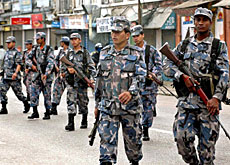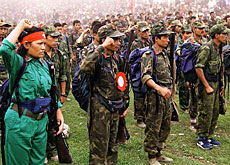Fighting hampers Swiss aid projects in Nepal

Swiss aid workers in Nepal are struggling to continue their projects following a new bout of violence in the country.
Riots broke out a week ago in the capital, Kathmandu, after 12 Nepalese workers were executed in Iraq. At least two people died in the outbreak of fighting in the city.
On Tuesday three bombs exploded in the heart of the capital outside a luxury hotel. No one was injured.
The latest unrest comes as the Swiss Agency for Development and Cooperation (SDC) faces continuing problems with Maoist rebels, who have been active in the Himalayan kingdom for the past decade.
The SDC runs a number of projects in the country, focusing on rural development, road building and vocational training.
The attacks on a mosque and several other Islamic establishments occurred a day after the news broke that Islamic militants in Iraq had killed the group of Nepalese workers.
Anarchy
Jörg Frieden of the SDC office in Kathmandu said there was a real fear among aid workers. The office had to be temporarily closed as a curfew took effect.
“For the first time since I have been in Nepal I had the feeling that we were facing real danger, because this was anarchic violence that was not controlled by anybody,” Frieden told swissinfo.
“The state was totally absent from the streets at least for a few hours.”
Citizens of Kathmandu were also very critical of the government forces, saying they could not understand why armed police were not able to stop the rioters.
“The police just stood by and watched while shops and houses were attacked,” one witness, who saw a mosque being destroyed, told swissinfo.
Maoist rebels
Frieden pointed out that Maoist rebels, who have been fighting to topple the monarchy since 1996, have made working in the kingdom more difficult in recent years.
“We’ve had to establish a good security system to make sure our workers, who are mainly Nepali, are not faced with any risks when they carry out their work,” said Frieden.
“The insurgency has slowed us down in providing services and support to the Nepalese people.”
According to Maoist information, the rebels currently control two-thirds of Nepal.
Permission to work
Frieden said that the rebels sometimes tell the SDC it needs written permission to work in a certain area, and even demand payment.
“These are demands that we cannot meet and whenever this has happened we have had to suspend our work for weeks and sometimes even for months,” he added.
But the insurgency has never forced the SDC to abandon a project completely, and after increased problems earlier this year, Frieden thinks the situation has actually improved in recent months.
“This year three or four projects have been hampered by problems with Maoists, but I have the impression that since June the pressure has been relieved and we have been able to resume our activities almost in all areas.”
Government’s role
According to Frieden, lack of Nepalese government support is also hindering the SDC in its work.
“We have had to adjust our activities over the past few years,” he told swissinfo. “Now we implement most of our projects through the local communities that are able to work in areas where the presence of the government is very limited or even totally absent.”
Switzerland has been providing aid to Nepal for 40 years, with the goal of reducing poverty reduction and promoting sustainable development. The SDC projects focus on rural development, street and bridge building and vocational training.
But as long as the political situation in the country is not resolved, Frieden thinks there will be no end to the violence.
Frustration
“This [latest] violence reflects the presence of thousands of young people, who have no education and no prospects… I think that kind of frustration was behind it,” Frieden explained.
Switzerland has repeatedly offered Nepal its assistance, and in March 2003 it brokered the first-ever talks between government officials and Maoist rebels in the Swiss capital, Bern.
The talks were aimed at building on a ceasefire, which had come into force a few weeks earlier. It broke down finally in August last year.
“The SDC is trying to do its best at a local level,” said Frieden. “Our vocational training programmes target young people who are willing to migrate, in the hope that they will earn a decent living abroad.”
“But, of course, our work remains a small contribution to a huge problem.”
swissinfo, Billi Bierling in Kathmandu
The SDC has been providing aid to Nepal for 40 years, focusing on forestry, road building and vocational training.
The Maoist insurgency in Nepal started in 1996, with the rebels fighting to topple the monarchy and instate a communist republic.
Some 9,000 people have died since the start of the rebel uprising in the Himalayan kingdom.

In compliance with the JTI standards
More: SWI swissinfo.ch certified by the Journalism Trust Initiative

You can find an overview of ongoing debates with our journalists here . Please join us!
If you want to start a conversation about a topic raised in this article or want to report factual errors, email us at english@swissinfo.ch.